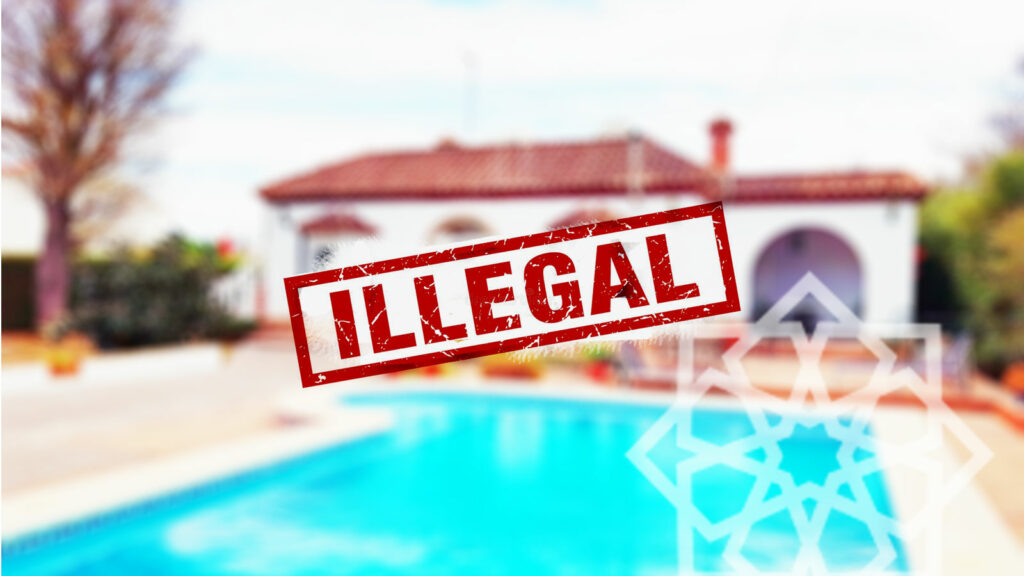
The Costa de la Luz is blessed with beautiful white villages, endless unspoiled beaches, an average of 330 days of sunshine a year, stunning natural parks and protected areas that prevent urban sprawls along the coast, and many fascinating ruins and relics from the past. Not everything is perfect though. Unfortunately, our government is not known for being highly efficient, especially when it comes to town planning. This situation, without parallel in ‘civilised’ Europe countries, has meant that around 50,000 houses without planning permission are registered in Cádiz alone (so-called ‘illegal properties’).
In some cases these properties can become a total headache and ruin the golden retirement of some of the many Europeans who choose to invest their life savings in our area, where they come in search of peace and quiet.
Over the past 15 years, our office has received innumerable enquiries from international clients (mainly British and German) who, puzzled by threatening letters from the town hall or whose power supply has been cut off, have asked us the following questions:
Is our house an illegal property, and what are the implications of owning an illegal property?
Sadly, most of these clients were sold illegal houses but were told the opposite; that they were fully legal and came with title deeds. In most cases the implications for the owners have not been too serious: not being able to undertake extension or refurbishment projects, having to pay the cost of urbanising the land in the future and, on occasion, potentially losing part of the plot due to road-widening projects. However, in extreme cases, the sale of these illegal properties has resulted in the electricity supply being cut off (due to being illegally connected to the grid), high levels of stress and frustration involved in long, drawn out processes of demolition orders, and even a threat to lives in the case of flood-prone houses sold to unsuspecting buyers.
Below we offer some tips and advice to potential home buyers so they can spot the red flags to avoid buying an illegal property and make life difficult for those who are out to deceive us.
WARNING Signs That The Property That You Are Being Sold Is Illegal
1.- Is the property connected to the electricity grid, MAIN water supply and, most importantly of all, the MAIN SEWER SYSTEM?
This is not an infallible rule, because in certain cases (mainly properties far from urban centres) licences can be granted for well water connections and eco-friendly septic tanks, but generally speaking, if the property is in a development with lots of small plots with houses and no sign of agricultural or farming activity, if there are no tarmacced roads, street lamps, pavements, drainage pipes and, above all, no mains water or sewer system, then it is highly likely you are being sold an illegal property.
2.- Is the property a villa and classified as ‘pro indiviso’ or ‘horizontal division’??
Some villas are sold as ‘pro indiviso’ or ‘horizontal division’. This means that you are not being sold a whole plot, only a percentage of it. So why does this happen? Rural plots of land (those not suitable for building) cannot be split below the unidad mínima de cultivo (minimum plot suitable for agricultural purposes, which is about 30,000 m2 on dryland). Since these plots cannot be split legally, potential sellers have come up with all sorts of tricks to side-step the law. The ‘pro indiviso’ system is one of these, which consists of only selling a percentage of the plot, and another is ‘horizontal division’, a method of fraud commonly used in Chiclana de la Frontera and Puerto de Santa María. This system -fortunately no longer permitted- consisted of hiring an architect who, (usually) for a generous fee, declared that a building had been built on the non-divisible plot that the owner had decided to split (the plot could not be split but a building could) into several ‘elements’ or ‘departments’. Each of these ‘elements’ could be allocated a separate plot number, and a percentage in the non-divisible plot. This way, 100% of each building belonged exclusively to the respective owners, even if they only owned 50% of the plot (in the case of a horizontal division of two elements) or 25% (horizontal division of four elements), and so on.
Therefore, if the property you are being sold is ‘pro indiviso’ or is included in a ‘régimen de proindivisión’, if you are being sold a percentage of the plot of land, if the deed mentions the terms ‘horizontal division’ or ‘propiedad horizontal tumbada’, or if the description of the property starts with the words “ELEMENT” OR “DEPARTMENT”, you are probably being sold an illegal house.
Incidentally, there are houses in urban areas that are part of a horizontal division scheme that are fully legal, but they are usually blocks of flats. If the property being sold to you is a villa-type property, is in a rural area and is part of a horizontal division scheme, then it is probably illegal.
3.- Areas without public buildings and without public services such as buses and, in particular, mail delivery.
Legal houses are usually in urbanised areas with tarmacced roads, street lamps, schools, playgrounds and public services such as mail delivery, which is compulsory in all urbanised areas. If the area where you are planning on buying does not have any of these facilities, you are probably being sold an illegal property.
4.- Ask for a copy of the BUILDING LICENCE and ‘LICENCE OF FIRST OCCUPATION’ (LFO):
The ‘Licence of First Occupation’ (LFO) is the official document that proves the legality of a building. When a property has been granted an LFO it is because 1) a building licence has been requested and 2) the building work has been formally declared complete and compliant with the project that was approved by the town planning department when the LFO was approved, either through a statement of responsibility from the architect overseeing the building work or following an inspection by employees from the town planning department. There are some houses that pre-date the 1975 Land Act (25/05/1975) and are considered legal even though they do not have an LFO, but this does not apply to houses built in the last 20-30 years, which is the case of most of the properties available on the Costa de la Luz. If you ask for a copy of the LFO from the person who is trying to sell you the house and their expression is inscrutable, the property is probably illegal (yes, again!).
If, even after reading this article, you still decide to buy an ‘illegal’ house due to your budget, because you prefer to live in a rural area or for any other reason, our advice would be to hire a lawyer specialising in urban planning law who knows the ins and outs of every area of the Costa de la Luz. An analysis of the legal status of the property could mean the difference between the house of your dreams or your worst nightmare.
Hot Spots of Illegal Properties:
Chiclana de la Frontera:
El Pinar de los Franceses – Batería Colorada, El Marquesado, Pago del Humo, Venta la Raya, Camila, Hozanejos, la Coquina, La Rana Verde, Las lagunas – Campano.Medina Sidonia:
Los Badalejos, Cantarranas, San José del Malcocinado, el Berrueco.Conil de la Frontera:
Barrionuevo – El Colorado, La Vigía, Los Majadales de Roche – Roche Viejo, Dehesa de la Villa, Carretera del Pradillo.Vejer de la Frontera:
El Palmar, La Oliva, San Ambrosio, La Muela, Patría, La Torre, Libreros, Naveros.Barbate – Zahara de los Atunes:
Zahora, Caños de Meca, San Ambrosio, Pago Rivera de la Oliva, la Oscuridad, El Cañillo, La Zarzuela.Tarifa:
Bolonia, El Lentiscal, el Almarchal, El Chaparral, Punta Paloma – Paloma Baja, Valdevaqueros, la Peña, Viviendas en la Carretera desde Valdevaqueros a Tarifa (Pedro Valiente, El Pozuelo, La Vega), el Bujeo, El Pelayo.
Juan Antonio Rodríguez García,
Lawyer, CostaLuz Estates Legal Department
+34 617073669
Please note that any information provided through the Costa Luz Estates blogs, website or social media pages is for informational purposes only and should not be used as the basis for making any particular decisions. Please remember that legislation and case law can change over time and the articles published through this medium may not be up-to-date, which is why we recommend you seek individual specialist advice.
CostaLuz Estates are property consultants who provide estate agency services to international clients who have become enamoured with the Costa de la Luz. Our own internal legal department, led by the reputed law firm TempleCAMBRIA, our membership of the Association of International Property Professionals and our use of the external dispute settlement procedure overseen by the Property Ombudsman mean you can rest assured that your decision to buy your dream home on the Costa de la Luz will be a smooth, enjoyable and stress-free experience.
